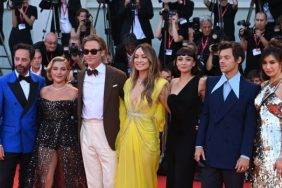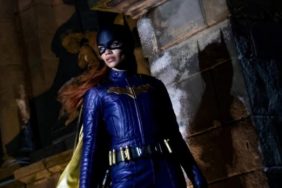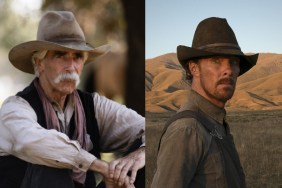Emmanuelle Seigner’s accent is intoxicating. The French actress, singer and (incidentally) wife of controversial director Roman Polanski is a vivacious conversationalist, funny and perfectly ready to ask questions when the answers are subject to speculation. Speaking to her over the phone about her latest project, Venus in Fur, directed (incidentally) by Roman Polanski was not unlike running into a really cool lady at a party and getting caught up for 20 minutes, as perhaps you will see below.
Venus in Fur, based on a play written by David Ives, stars Seigner as Vanda, an actress auditioning for a director named Thomas (Mathieu Almaric) to star in his adaptation of Leopold von Sader-Masoch’s Venus in Fur, a classic novel that helped define modern notions of sexual masochism. As they rehearse the play, the lines between their characters and their real personalities blur – if indeed, there was ever a difference – and the real nature of this mysterious actress is finally revealed… or is it? The mysteries of Vanda, the playfully fantastic nature of Roman Polanski’s interpretation of the play and the temptation to compare the film’s events to her real-life relationship with her director are all fair game in the following interview.
CraveOnline: To paraphrase the film, it’s an ambiguous movie in some ways. Who or what is Vanda?
Emmanuelle Seigner: Oh… [laughs] we don’t know what she is because we don’t know if she’s an actress who wants to take her revenge, or if she is the Vanda from the Sacher-Masoch book who is coming back, or is she a goddess, or is she only in his mind?
As the actress playing her do you have to decide for yourself?
No, I haven’t. I haven’t actually.
Is that a conscious choice?
I haven’t decided. I don’t know who she is. What do you think?
You know, I don’t know. If I had to guess I’d say she’s probably in his mind.
That’s an interesting issue. Yeah. It could be like in Rosemary’s Baby, when you think that maybe it’s all in her mind. Something like that.
The thing is, the film – I assume unlike the play, since I haven’t seen a production of the play – opens with this kind of spectral shot leading up to the theater, and the door opens on its own. Now I don’t know.
I think Roman made it in such a way that it would be slightly fantastic, like the film is not real in way. There are a lot of details, like the bag she has, like Mary Poppins, with all the things [in it]. Like the fact she knows everything and that, so it’s a little bit unnatural. And I think that’s what’s interesting about it. Also, I don’t know if it’s so much in the play, I’m not sure about it – I haven’t seen the play – but I think in the play it’s a bit more realistic, no?
I haven’t seen it myself.
Okay.
You haven’t made a lot of movies with Roman. What made this a character that you wanted to play, or that he wanted you to play, or both?
I mean, we were looking for a good piece to do together for quite a while because we wanted something that was good for him and that was a good part for me, and something we could do, like… I always loved his early movies like Knife in the Water and Cul-de-sac and Repulsion, and I wanted to do something more in this way than the movie he did Tess, which are like bigger movies. I wanted to do something a bit like that, like intimate. So when we read the material we thought it was the right thing to do.
I think it’s going to be really easy for people to project onto this film. Here is a film made by a director and an actress about a director and an actress.
Yeah, I know. But it’s not really the point. I mean, I know people will think that it’s our type of relationship but not at all. I can promise you. [Laughs.] It’s not at all like that. It could be… it’s an actress and a director but it could be anybody, in a way.
It is tricky though, because I was thinking that as I was watching the movie. “Oh, this isn’t them.” But then there’s a part in the movie where Mathieu Almaric keeps fighting the idea that his work is him, but then the movie keeps contradicting that and saying that it is. And I’m like, “I don’t know what to believe anymore.”
[Laughs.] But I think also that that movie is a lot of fun. To me, I sit also on the side of a big joke in a way. That’s what makes it so special, that it’s so funny and it’s so… how do you say… witty, in a way.
It’s very fun, and a large part of it is just you coming in – like you said, like Mary Poppins – and wrecking this guy’s world a little bit.
Yeah, yeah. The way she likes fucking with his brain is so funny, I think. I really enjoy that, I must say.
And Mathieu is such a great straight man. He’s got these bewildered eyes.
Yeah, he’s so good. It’s such a difficult part to play because, I mean, she’s like controlling everything, so I think his part in a way is more difficult than mine because he has to be so subtle. It’s very tricky. And he’s so good in it. He’s really amazing.
Well, he’s always amazing. But he is good in this.
Yeah, he’s always amazing. I agree.
Is it true that Louis Garrel was originally cast in his role?
Yes, actually. Yes, yes.
Did you do any work with him? Do you think that would have been a dramatically different movie?
It would have been a very different thing, you know? Completely different. But I think Mathieu was more right for the role.
When you’re doing a film that’s a single location and takes place over a brief period of time, does that change the rehearsal process? Did you just go through the entire film?
It was actually a moment very special because it was Christmas, and it was snowing outside, and we didn’t have much time to do the film because I was on tour with Ultra Orange and I was playing Homecoming, and Mathieu had to do something else after, so we only had this gap. So we were working a lot of hours – like I don’t know, 12 hours a day – and it was very nice and fun and it was a very special moment. It was really… it was a lot of work but it was fun and we were not struggling and we were not… it was one of those magic moments. You know, sometimes when you work it can be really magical, and the fact that we were all in the room it was really special in a way. I think it was great.
It seems like David Ives’ work is very specifically written. Is there any room to improvise with a script like this or do you have to make sure every sentence comes out right, because it all has meaning?
It’s a combination. There were a lot of lines to learn and it was very controlled, but also I could improvise a little bit. We did improvise with Mathieu a little bit, like little things. A little sentence and little actions and little stuff were improvised sometimes to make it more real, but we really had fun with the piece. We had a text and we the situations and we had all this and we couldn’t improvise so much, but little moments.
What sort of moments that made it into the film, for example?
Like when I’m jumping, when I’m taking off my corset and I’m jumping. And little sentences I would say that were improvised. Little moments, you know? Not big things.
I find this film fascinating because in some ways its an adaptation of Venus in Furs and in some ways it’s a dissection of it.
Oh yeah, it is actually. So it’s like, at the same time it talks about S&M and at the same time it makes fun of it and criticizes it. Like my character, when she says this is humiliating to a woman, and this is porno, this is horrible and you can’t do that to a woman and everything. So it’s both, and I think that’s what’s very interesting in the piece that you have two things and many more.
I think it’s daring to take a stand on it. I feel like the end of the movie comes down pretty hard on Vanda’s opinion being, if not right, then certainly stronger.
Yeah. Vanda, she’s right about it when she says you can’t do that to a woman, it’s a humiliation for a woman. I think she’s right. I think it’s a feminist film.
Did you find it necessary to read the book in order to understand her ire about the content, or did you just read the script?
No, actually I hadn’t read the book by Sacher-Masoch. I haven’t. I haven’t. But Mathieu, on the first day of shooting, offered me a book on the real Vanda, the one that inspired Sacher-Masoch. She read the book and she made a confession, and I read that and it was very interesting.
I was unaware of that. What sort of revelations came out of that for you?
Oh, like she tells of when she married him she was a young girl and she met that guy, and they went into that relationship and then she became somebody else. At the beginning she was very poor and had no money and he gave her a lot of money, but then… it’s interesting. It’s very interesting. You should read it.
I guess I should. So much of this movie is about a shifting power dynamic…
Yeah, absolutely. Absolutely.
Tell me about your costumes in this film, because there’s not a lot to them but they have to go through a lot of different phases.
Yeah.
Can you tell me a little bit about how you chose your costuming and how that evolves?
That’s Roman. He was very precise ideas about how I should be dressed and how [Mathieu Almaric] should be dressed, and he wanted us to have a lot of different looks without changing anything. Like, little things that makes it very different. That’s what Roman is really genius [about]. It goes from the wet hair and looking like a tramp… a bit like My Fair Lady in a way, you know? At the beginning she’s so dirty and then she becomes more beautiful and more elegant. It’s very much like that in a way.
There’s moment later in the film when Mathieu leaves the room, and he comes back and you’re on the chaise lounge on the phone, and it looks like someone did something fabulous to your hair while he was off-camera.
Yeah! [Laughs.] I know, I know, but that is… The movie is not realistic, also. Because she has this magical power, so she’s like Mary Poppins!
Is that something you were consciously thinking about? You’ve brought up Mary Poppins a couple of times.
Oh yeah, we were looking to make it different and then make a different atmosphere and the light is changing and everything.
I feel like this is more the Mary Poppins from the book than the movie. Did you read the book or did you see the movie?
The book of Mary Poppins?
Yeah.
No, I have not read that.
Oh, the book is so much better and darker.
Oh really! I love the movie though.
Oh, the movie is wonderful, it’s just a very different version of the story.
Well I like the characters in movies when they’re changing a lot. That’s a lot of fun, I think.
Vanda isn’t really someone who changes over the course of this film. She comes in as a force of nature.
Yeah. Yeah, she goes from a lot of different stages, like at the beginning when she’s very vulgar and everything, and then she becomes the actress of the play and she becomes this German person and then a psychiatrist and slowly, slowly she becomes a goddess. So there’s a lot of things to do. It was fun.
Read More Exclusive Film Channel Interviews:
William Bibbiani is the editor of CraveOnline’s Film Channel and the host of The B-Movies Podcast and The Blue Movies Podcast. Follow him on Twitter at @WilliamBibbiani.
Read More Exclusive Film Channel Interviews
-
Planes: Fire & Rescue - Dane Cook's Ninja Interview

Comedian Dane Cook goes full ninja while talking Planes: Fire & Rescue and disproving our theories of the vehicular apocalypse.
-
Sex Tape: Jason Segel & Cameron Diaz on Deleted Sex Acts

The stars of Sex Tape act out a sexual situation that got cut from the finished film. Here's a hint: donkeys.
-
Planes: Fire & Rescue - Julie Bowen Interview

Julie Bowen explains why her Emmy could beat up an Oscar while talking about Planes: Fire & Rescue.
-
Sex Tape: Rob Corddry & Ellie Kemper on Sequels

The co-stars of Sex Tape reveal their ideas for a sequel starring their supporting characters.
-
Boyhood: Ellar Coltrane on Vanquishing Social Media

Just like his on-screen counterpart, the star of Richard Linklater's Boyhood really does think that social media is evil.
-
Deliver Us From Evil: Edgar Ramirez Performs an Exorcism

EXCLUSIVE VIDEO: Watch Deliver Us From Evil star Edgar Ramirez perform an exorcism on host William Bibbiani.
-
Deliver Us From Evil: Olivia Munn Pickle Interview

EXCLUSIVE VIDEO: Watch Deliver Us From Evil star Olivia Munn offer to do unspeakable things to William Bibbiani with a pickle.
-
Boyhood: Patricia Arquette Talks Momhood and Armpits

Boyhood star Patricia Arquette compares making a movie over the course of 12 years to starring in "Medium," and relives a moment from Flirting with Disaster.
-
Earth to Echo: Director and Screenwriter Interview

Director Dave Green and screenwriter Henry Gayden discuss the robot’s homeworld and say they wanted more swearing.
-
Transformers: Age of Extinction: Ehren Kruger Interview

The screenwriter answers our questions about the film’s new sci-fi theology and the mysterious fate of Sam Witwicky.








